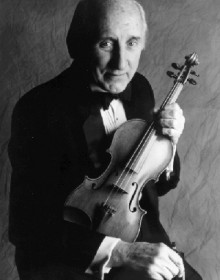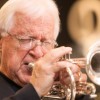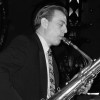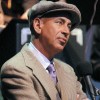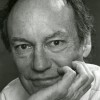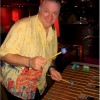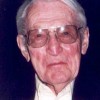Johnny Frigo was born in 1916 on the south side of Chicago. His earliest gigs were playing string bass and tuba in nightclubs and amusement parks. In the early 1940s, Johnny played bass in the Chico Marx Orchestra.
“I think it was 1941. The Marx Brothers were between movies and Chico Marx took a big band out on a theater tour. I joined him in Kansas City. Chico heard that besides bass, I played violin so he told me to bring my violin to the next performance…he called me up with my fiddle and started asking me questions; I gave him answers. Some of them turned out funny and, after two or three cities, we had a routine. But then I saw one of the Marx Brothers’ movies. There was this actor named Leon Bellasco…he was a continental-type head waiter–he played all those parts–and he also played violin. While I was watching this movie I realized that Leon was doing all the little routines I had created with Chico.”
During WWII, Johnny joined the Coast Guard and played with Al Haig and Kai Windig. After the war, Johnny was called to play with the Jimmy Dorsey Orchestra. Afterward, he formed a group to play at the Stuyvesant Hotel in Buffalo, the Soft Winds Trio with Herb Ellis on guitar and Lou Carter on piano.
“That became a phenomenal trio. We were all single, rehearsing like crazy, and were playing that George Shearing sound before George even had it. We wrote songs like “I Told Ya I Love Ya, Now Get Out!” Cybill Shepard later sang that in the season opening episode of Moonlighting. And I wrote “Detour Ahead” that became a jazz standard.”
Frigo went home to Chicago in 1951 and spent the next 35 years as a studio bass player. Settling into a busy post-war jingle scene, Frigo quickly became the Windy City’s first-call studio bassist, a position bolstered by his songwriting abilities.
“In Chicago, I had to start over. There was a singer I met named Lucy Reed who heard me sitting in with Shearing and hired me to play a North Side club called Lei Aloha. I called a pianist I heard–Dick Marks, and the gig took off like a rocket…It was sort of a bar for winos, but in four weeks it was completely transformed; a metamorphosis. Word got around, and people waited around the corner to get in. We ended up making three albums on Mercury by ‘Dick Marks and Johnny Frigo.’ All the while I was looking at my fiddle in the other room. I’d open up the case every few weeks and see if the strings were still on it.”
In the early 1980s, he decided to devote his energies fully to the violin. After sitting in one night with Herb Ellis, Monty Alexander and Ray Brown, he was invited to record two live albums with them in Europe, Triple Treat II and Triple Treat III on Concord. He became Johnny Carson’s favorite fiddler, appearing twice on theTonight Show. When Carson asked Frigo why it had taken so long to get his jazz violin career going, he said, “I wanna take as long as I could in my life so I wouldn’t have time to become a has-been”
Beginning in 1951, Frigo led his own group, The Sage Riders, playing violin on the national radio program National Barn Dance for 12 years.
Mid-November 1995 saw a reunion of the Soft Winds Trio aboard the S.S. Norway.This time, Johnny played violin along with Herb Ellis, guitar; Keter Betts, bass; and Lou Carter, piano. The session was recorded aboard the Norway and was released on the Chiaroscuro label as Soft Winds Then And Now.
Frigo wrote and performed the 1969 Chicago Cubs fight song “Hey Hey, Holy Mackerel.”
In addition to his music, Johnny was also an artist and composed poetry and crossword puzzles. A book of his poetry and pastel drawings titled When My Fiddle’s in the Case was published recently. Johnny said, “I’m in love with all things. Jazz is a part of what I do, but my life is much more than just that.”
Johnny Frigo died in 2007 at the age of 90.


